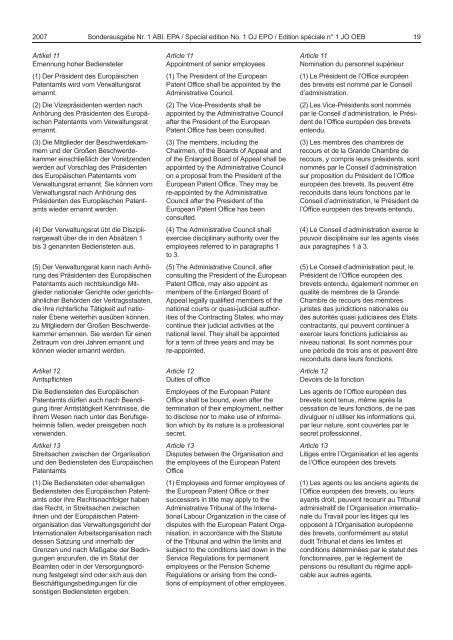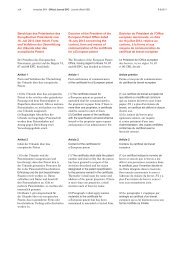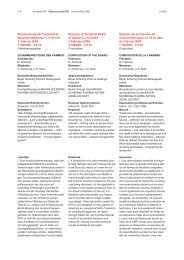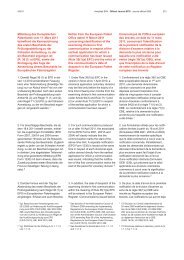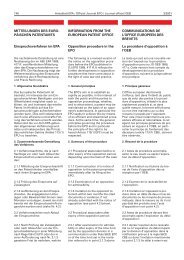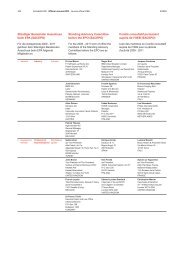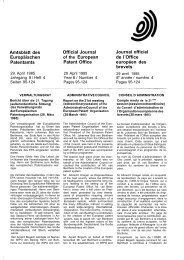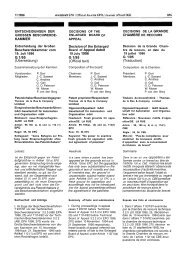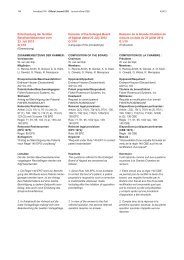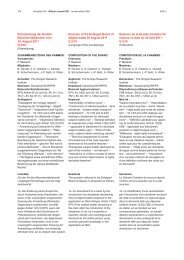Sonderausgabe 1 - European Patent Office
Sonderausgabe 1 - European Patent Office
Sonderausgabe 1 - European Patent Office
You also want an ePaper? Increase the reach of your titles
YUMPU automatically turns print PDFs into web optimized ePapers that Google loves.
2007 <strong>Sonderausgabe</strong> Nr. 1 ABl. EPA / Special edition No. 1 OJ EPO / Edition spéciale n° 1 JO OEB 19<br />
Artikel 11<br />
Ernennung hoher Bediensteter<br />
(1) Der Präsident des Europäischen<br />
<strong>Patent</strong>amts wird vom Verwaltungsrat<br />
ernannt.<br />
(2) Die Vizepräsidenten werden nach<br />
Anhörung des Präsidenten des Europäischen<br />
<strong>Patent</strong>amts vom Verwaltungsrat<br />
ernannt.<br />
(3) Die Mitglieder der Beschwerdekammern<br />
und der Großen Beschwerdekammer<br />
einschließlich der Vorsitzenden<br />
werden auf Vorschlag des Präsidenten<br />
des Europäischen <strong>Patent</strong>amts vom<br />
Verwaltungsrat ernannt. Sie können vom<br />
Verwaltungsrat nach Anhörung des<br />
Präsidenten des Europäischen <strong>Patent</strong>amts<br />
wieder ernannt werden.<br />
(4) Der Verwaltungsrat übt die Disziplinargewalt<br />
über die in den Absätzen 1<br />
bis 3 genannten Bediensteten aus.<br />
(5) Der Verwaltungsrat kann nach Anhörung<br />
des Präsidenten des Europäischen<br />
<strong>Patent</strong>amts auch rechtskundige Mitglieder<br />
nationaler Gerichte oder gerichtsähnlicher<br />
Behörden der Vertragsstaaten,<br />
die ihre richterliche Tätigkeit auf nationaler<br />
Ebene weiterhin ausüben können,<br />
zu Mitgliedern der Großen Beschwerdekammer<br />
ernennen. Sie werden für einen<br />
Zeitraum von drei Jahren ernannt und<br />
können wieder ernannt werden.<br />
Artikel 12<br />
Amtspflichten<br />
Die Bediensteten des Europäischen<br />
<strong>Patent</strong>amts dürfen auch nach Beendigung<br />
ihrer Amtstätigkeit Kenntnisse, die<br />
ihrem Wesen nach unter das Berufsgeheimnis<br />
fallen, weder preisgeben noch<br />
verwenden.<br />
Artikel 13<br />
Streitsachen zwischen der Organisation<br />
und den Bediensteten des Europäischen<br />
<strong>Patent</strong>amts<br />
(1) Die Bediensteten oder ehemaligen<br />
Bediensteten des Europäischen <strong>Patent</strong>amts<br />
oder ihre Rechtsnachfolger haben<br />
das Recht, in Streitsachen zwischen<br />
ihnen und der Europäischen <strong>Patent</strong>organisation<br />
das Verwaltungsgericht der<br />
Internationalen Arbeitsorganisation nach<br />
dessen Satzung und innerhalb der<br />
Grenzen und nach Maßgabe der Bedingungen<br />
anzurufen, die im Statut der<br />
Beamten oder in der Versorgungsordnung<br />
festgelegt sind oder sich aus den<br />
Beschäftigungsbedingungen für die<br />
sonstigen Bediensteten ergeben.<br />
Article 11<br />
Appointment of senior employees<br />
(1) The President of the <strong>European</strong><br />
<strong>Patent</strong> <strong>Office</strong> shall be appointed by the<br />
Administrative Council.<br />
(2) The VicePresidents shall be<br />
appointed by the Administrative Council<br />
after the President of the <strong>European</strong><br />
<strong>Patent</strong> <strong>Office</strong> has been consulted.<br />
(3) The members, including the<br />
Chairmen, of the Boards of Appeal and<br />
of the Enlarged Board of Appeal shall be<br />
appointed by the Administrative Council<br />
on a proposal from the President of the<br />
<strong>European</strong> <strong>Patent</strong> <strong>Office</strong>. They may be<br />
reappointed by the Administrative<br />
Council after the President of the<br />
<strong>European</strong> <strong>Patent</strong> <strong>Office</strong> has been<br />
consulted.<br />
(4) The Administrative Council shall<br />
exercise disciplinary authority over the<br />
employees referred to in paragraphs 1<br />
to 3.<br />
(5) The Administrative Council, after<br />
consulting the President of the <strong>European</strong><br />
<strong>Patent</strong> <strong>Office</strong>, may also appoint as<br />
members of the Enlarged Board of<br />
Appeal legally qualified members of the<br />
national courts or quasijudicial authorities<br />
of the Contracting States, who may<br />
continue their judicial activities at the<br />
national level. They shall be appointed<br />
for a term of three years and may be<br />
re-appointed.<br />
Article 12<br />
Duties of office<br />
Employees of the <strong>European</strong> <strong>Patent</strong><br />
<strong>Office</strong> shall be bound, even after the<br />
termination of their employment, neither<br />
to disclose nor to make use of information<br />
which by its nature is a professional<br />
secret.<br />
Article 13<br />
Disputes between the Organisation and<br />
the employees of the <strong>European</strong> <strong>Patent</strong><br />
<strong>Office</strong><br />
(1) Employees and former employees of<br />
the <strong>European</strong> <strong>Patent</strong> <strong>Office</strong> or their<br />
successors in title may apply to the<br />
Administrative Tribunal of the International<br />
Labour Organization in the case of<br />
disputes with the <strong>European</strong> <strong>Patent</strong> Organisation,<br />
in accordance with the Statute<br />
of the Tribunal and within the limits and<br />
subject to the conditions laid down in the<br />
Service Regulations for permanent<br />
employees or the Pension Scheme<br />
Regulations or arising from the conditions<br />
of employment of other employees.<br />
Article 11<br />
Nomination du personnel supérieur<br />
(1) Le Président de l’<strong>Office</strong> européen<br />
des brevets est nommé par le Conseil<br />
d’administration.<br />
(2) Les VicePrésidents sont nommés<br />
par le Conseil d’administration, le Président<br />
de l’<strong>Office</strong> européen des brevets<br />
entendu.<br />
(3) Les membres des chambres de<br />
recours et de la Grande Chambre de<br />
recours, y compris leurs présidents, sont<br />
nommés par le Conseil d’administration<br />
sur proposition du Président de l’<strong>Office</strong><br />
européen des brevets. Ils peuvent être<br />
reconduits dans leurs fonctions par le<br />
Conseil d’administration, le Président de<br />
l’<strong>Office</strong> européen des brevets entendu.<br />
(4) Le Conseil d’administration exerce le<br />
pouvoir disciplinaire sur les agents visés<br />
aux paragraphes 1 à 3.<br />
(5) Le Conseil d’administration peut, le<br />
Président de l’<strong>Office</strong> européen des<br />
brevets entendu, également nommer en<br />
qualité de membres de la Grande<br />
Chambre de recours des membres<br />
juristes des juridictions nationales ou<br />
des autorités quasi judiciaires des Etats<br />
contractants, qui peuvent continuer à<br />
exercer leurs fonctions judiciaires au<br />
niveau national. Ils sont nommés pour<br />
une période de trois ans et peuvent être<br />
reconduits dans leurs fonctions.<br />
Article 12<br />
Devoirs de la fonction<br />
Les agents de l’<strong>Office</strong> européen des<br />
brevets sont tenus, même après la<br />
cessation de leurs fonctions, de ne pas<br />
divulguer ni utiliser les informations qui,<br />
par leur nature, sont couvertes par le<br />
secret professionnel.<br />
Article 13<br />
Litiges entre l’Organisation et les agents<br />
de l’<strong>Office</strong> européen des brevets<br />
(1) Les agents ou les anciens agents de<br />
l’<strong>Office</strong> européen des brevets, ou leurs<br />
ayants droit, peuvent recourir au Tribunal<br />
administratif de l’Organisation internationale<br />
du Travail pour les litiges qui les<br />
opposent à l’Organisation européenne<br />
des brevets, conformément au statut<br />
dudit Tribunal et dans les limites et<br />
conditions déterminées par le statut des<br />
fonctionnaires, par le règlement de<br />
pensions ou résultant du régime applicable<br />
aux autres agents.


